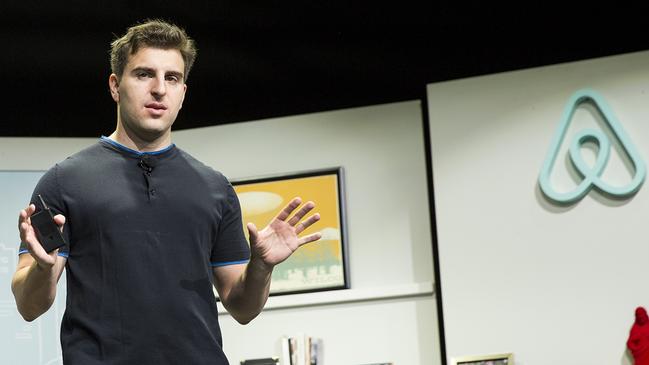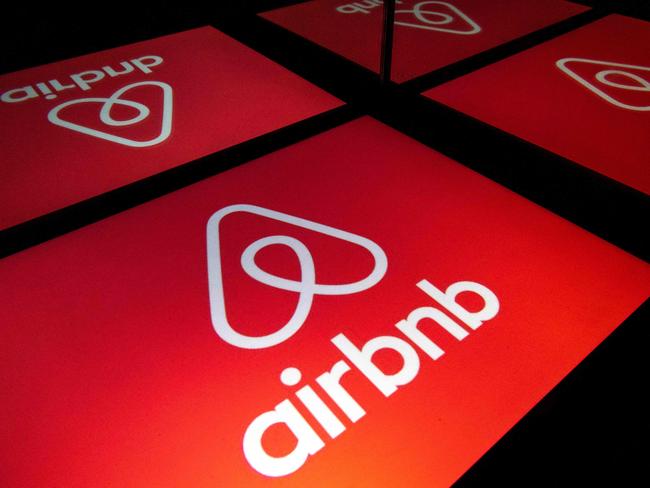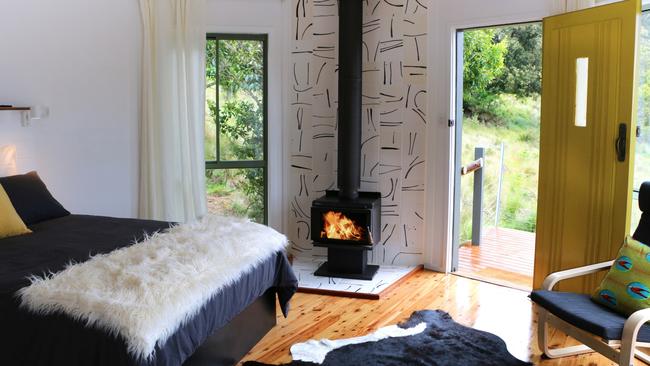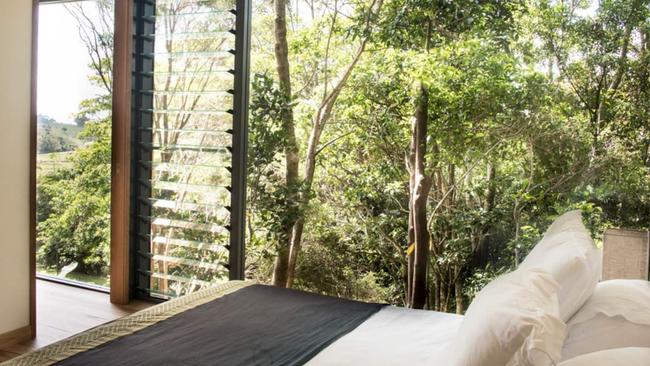How Airbnb pulled back from the brink
Fighting to keep Airbnb alive in the pandemic, CEO Brian Chesky saw a move to local holiday stays. So he quickly switched strategy.

In May, after fighting to keep Airbnb from the brink of collapse, chief executive Brian Chesky started noticing signs of life in part of his business.
Urban residents were searching for vacation rentals in neighbouring towns and cities, so they didn’t have to fly. People wanted to book entire homes, meaning Airbnb could gain from travellers shunning hotels and their shared spaces.
Mr Chesky quickly switched Airbnb’s strategy. Big cities visited by tourists had been Airbnb’s strength, but it would now focus on local stays. By June, the company had redesigned its website and app so its algorithm would show prospective travellers everything from cabins to lavish beach houses near where they lived.
On July 8, guests booked stays at the rate they were just before the pandemic brought travel and tourism to a halt. In August, more than half of those bookings made were for stays within 500km of the guest’s location, according to the company.
It was a lucky break, and Airbnb was in position to capitalise on it. The CEO made more changes, including cutting marketing, putting many noncore projects on hold and laying off a quarter of the staff.
“I did not know that I would make 10 years’ worth of decisions in 10 weeks,” Mr Chesky said in an interview.
The upswing has put the homesharing giant on a path to go public and report a third-quarter profit this year, according to investors, something that seemed all but impossible months ago.
The company declined to comment on its finances or any details of its IPO plans.
Airbnb is expected to list shares in late November or December at a valuation of $US30 billion or more, nearly twice as much as its valuation just six months ago when it sought a capital injection, according to people familiar with its plans. The company will debut in the hottest IPO market in years, in which the stock prices of newly public companies have soared and are on track to hit a record for dollars raised.
While business this year will be nowhere close to pre-pandemic levels, and the future of travel is uncertain, some of Mr Chesky’s critics and observers said he won them over with quick thinking and bold moves.

“What impressed me was how quickly he did it,” said Michael Seibel, the chief executive of Y Combinator, the Silicon Valley accelerator that mentored and spawned companies like Dropbox, DoorDash and Airbnb. “Airbnb isn’t a small organisation anymore. He could’ve waited it out.”
The pandemic has reinvented travel, possibly in lasting ways, as many businesses make remote work a permanent fixture. While some people will move to the suburbs, Mr Chesky said, others will become globetrotting nomads. Even those that return to work will have more flexibility, leaving room to travel locally.
“The line between travel and working is blurring,” he said.
Moving quickly to keep up with a changing industry was lesson No. 1 of the pandemic. Over the months, Mr Chesky would notch a few more: Don’t overextend spending on marketing, staffing or noncore projects. And listen to your customers -- in Airbnb’s case, both travellers and property owners.
The 39-year-old had his share of critics and challenges before COVID-19. Mr Chesky had toyed with going public for years but stopped short of pulling the trigger. Some investors were frustrated they couldn’t cash out when Wall Street was more hospitable to money-losing start-ups.
Others worried he was spending too much on forays into areas such as television shows that had little to do with the company’s core business. Last year’s net loss was greater than the losses of the previous two years combined.
Back to its roots
The post-pandemic Airbnb looks a lot more like the company Mr. Chesky and his two co-founders started in their San Francisco apartment more than 10 years ago.
Mr Chesky said the pandemic forced him to go “back to our roots.” He refocused on home rentals and scaled back efforts to become a broader travel behemoth.
Questions remain on whether the growth in revenue and bookings is sustainable, or whether Airbnb is simply the main beneficiary of a battered industry. Mr. Chesky’s sceptics also wonder how long he can keep costs down and stick to the core business.
Airbnb must also contend with cities weighing zoning restrictions on short-term rentals. Some persistent challenges, such as the company’s struggle to police crime and safety on its listings, are expected to come under more scrutiny as Airbnb sells its shares to the public.
It was a wildly different story in March, when the main question about Airbnb was if it would make it at all. Bookings were in free fall in Europe, down 80 per cent year-over-year in the second week of the month. The US was beginning to shut down.
The stats “hit my inbox like a bomb,” Mr Chesky said. “I had never seen numbers like this before.” He called an emergency board meeting over the weekend.
Partners from venture-capital firms including Sequoia Capital and Andreessen Horowitz dialled into Zoom for the first of what would become many Sunday board meetings.
With bookings wiped out, Airbnb was burning through its reserves and needed a swift infusion of cash.
“This is going to be bigger than 9/11 and 2008 combined,” board member and former American Express chief executive Kenneth Chenault remembers saying. “This is your defining moment as a leader,” he said to Mr Chesky.
On the evening of March 26, Mr Chesky wrapped up a sobering video call with thousands of employees, telling them “everything is on the table,” including lay-offs.
Afterward, he saw a text from Morgan Stanley’s top technology banker, Michael Grimes, about a potential debt investment from Silver Lake and Sixth Street Partners. Bankers had spent days working on a different financing option that would have given prospective investors the right to own more than 5 per cent of the company.
The Silver Lake and Sixth Street deal would entitle them to 1.25 per cent of the company. It came at a steep interest rate of 11 per cent, but it was a better bet if Airbnb could repay or refinance the money quickly.

The industry at large, he said, was betting on business travel recovering faster than leisure, because that’s what happened the last time travel shut down in the wake of 9/11. Airbnb’s hotel-centric rivals, Booking Holdings and Expedia Group, would stand to gain if so.
Mr Chesky was betting on the opposite, for a simple reason: “9/11 was before Zoom,” he said.
Unlike hotels, Airbnb didn’t own any properties. Its overhead costs were low, and it didn’t need a minimum occupancy to keep doors open.
He chose the debt. Bankers cranked out a term-sheet in 72 hours. Silver Lake and Sixth Street lent the company $US1 billion. An additional $US1 billion loan followed from another consortium of investors.
At the time, Mr Chesky and his co-founders had relinquished their salaries, cut pay in half for executives and slashed nearly $US1 billion in marketing expenses. It wasn’t enough. Mr Chesky said he ran through hundreds of expense items “line by line.”
“There were moments where he said, ‘Oh my God, is this going to end?’ “ according to a friend whom Mr Chesky turned to for advice. “There were moments where he was incredibly discouraged, when he thought his dream was going to go down the drain.”
On May 5, he choked back tears and announced on a videoconference his plan to lay off 1900 employees. He also scaled back ambitious moves to list traditional hotels and luxury properties and paused diversifying into newer areas such as transportation and media.
Ambitions thwarted
The cuts were a dramatic pullback from Mr Chesky’s ambitions. He had previously told investors, advisers and employees in all-hands meetings that as long as he hired the smartest people, nothing would stop the company’s growth. That mentality worried investors, who watched Mr Chesky spend heavily to recruit talent. In 2018, he hired Greg Greeley, one of Amazon.com Inc.’s most senior and longest-serving executives, to run the core home-rental unit.
Mr Chesky himself was spending more of his time focused on newer bets, including Experiences, which lets people book activities like mountaintop yoga, wine tastings and pottery classes. He had been describing the company as one with big, broad ambitions -- using phrases such as the “magical world of Airbnb” that had an “infinite time horizon.”
Last year, the company bought the hotel-booking site Hotel Tonight as it sought to generate revenue growth by adding hotels to its mix. It hired an airline veteran to be its global head of transportation. It also released a feature film about a gay men’s chorus and had plans for more.
The pandemic up-ended those efforts. Mr Greeley left the company this year, and Mr Chesky turned his attention back to Airbnb’s main business. He said he would keep his focus there even after things return to normal.
Mr Greeley didn’t respond to a request for comment about Airbnb.
Mr Chesky told investors and advisers he never wants to be forced to cut staff in a dramatic way again. To avoid that, he said he has no immediate plans to boost the company’s marketing budget and will keep other expenses low, according to people familiar with these discussions. “He’s off that drug,” said an investor.
Laid-off employees were allowed to keep company-issued Apple laptops and received a year of health insurance. Airbnb posted an online talent directory of departing employees so companies looking to hire could tap them, and separately said its recruiters would assist in finding them jobs. Half a dozen former and current employees said in interviews they felt new-found respect for Mr Chesky because of the way he handled the lay-offs.
The CEO increased communication with existing employees, switching to weekly Q&As from monthly. He also sought to make amends with hosts angered by his refund policy at the height of the pandemic shutdown by allocating funds from the money he raised to reimburse them for a third of cancelled stays.
Earlier in the crisis, he had stepped in to refund guests for cancellations with funds meant for property owners, who then blamed him for emptying their coffers overnight. Mr. Chesky had regretted not outlining some relief to hosts in conjunction with his offer to guests, according to a person he frequently consulted.
Many cash-strapped hosts had pulled their properties, listing them for sale or on the traditional rental market.
Then, this (northern) summer, the stars began to align in Mr Chesky’s favour. Families, students and friends were turning to Airbnbs as quarantine lodging. And, as local governments eased restrictions around the world, people in big cities ventured into neighbouring towns and cities, where big-chain hotels don’t have a footprint.
Global and US reservations are still down year-over-year but are recovering from April lows, when global reservations dropped more than 50 per cent, according to market-research firm AirDNA. Future stays booked in the US have risen year-over-year from June through August, AirDNA data show.

Airbnb’s rental inventory, which had sharply plummeted since March, rose in August.
Data from Edison Trends, which based its analysis on more than 400,000 e-receipts, found consumers spent more on Airbnb from June through late September than on bookings via Marriott International, InterContinental Hotels Group or Hilton Worldwide Holdings.
The rebound has been better than the best-case scenario that bankers had pitched investors months ago, when they forecast business would start to pick up in the last three months of the year.
The company posted a loss of $US397 million in the second quarter as revenue dropped 72 per cent from the year-earlier period, according to people familiar with the company’s financial results. Operating expenses fell 38 per cent in the period, because of cutting most of its marketing spending and lay-offs. By contrast, operating costs jumped 48 per cent in the second quarter of 2019 from the year-earlier quarter.
Mr Chesky said he spent most of the past several months working 16-hour-shifts, largely glued to his iMac. When he is on the phone, he paces up and down his makeshift office -- a six-by-six metre attic on the top floor of his home in San Francisco’s trendy Mission neighbourhood. At times, he spoke with his board while sitting on a bench in nearby Dolores Park.
Mr Chesky’s mum, who was in the city before the lockdown, moved in. He hadn’t lived with her since high school, more than two decades ago. He purchased his first bicycle, frequently riding it around the park, and sought refuge in baking chocolate-chip cookies.
With business recovering, Mr Chesky wanted to send a strong signal to investors and boost morale among employees, some of whom were anxious about their stock options expiring at the end of the year, according to the person Mr Chesky has frequently consulted.
In recent months, Airbnb rehired a handful of its laid-off employees. In a companywide virtual meeting on Thursday, Mr Chesky announced Airbnb was reinstating its employee bonus program.
Wall Street Journal



